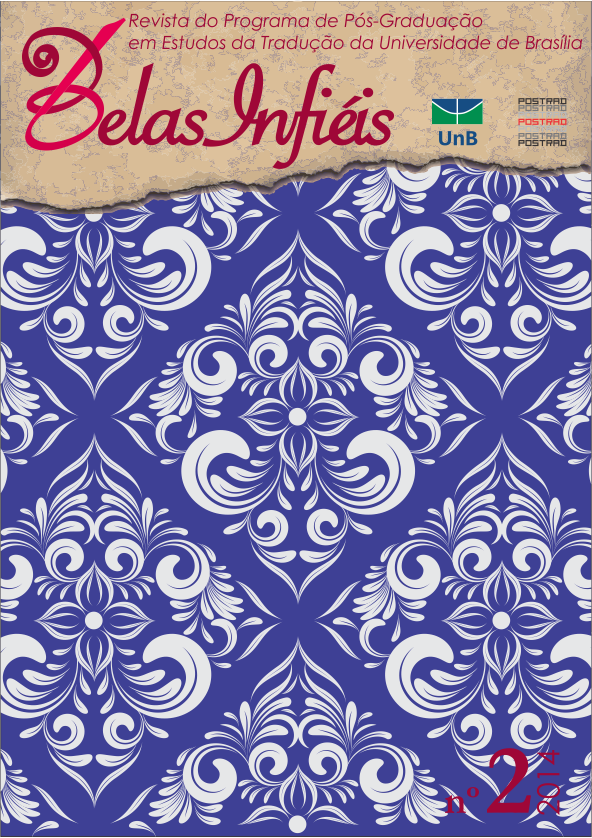O NOME E A NATUREZA DOS ESTUDOS DO TRADUTOR
DOI :
https://doi.org/10.26512/belasinfieis.v3.n2.2014.11280Résumé
Uma tendência recente das pesquisas sobre Estudos da Tradução é focar explicitamente no tradutor, de alguma maneira, em detrimento à s traduções de textos. Esta tendência pode ser denominada pelo termo “Estudos do Tradutor”. Este artigo visa atestar que este novo enfoque é representado inadequadamente no mapa clássico proposto por Holmes. Evidências sobre esta tendência são observadas principalmente na sociologia da tradução, bem como na história da tradução e em pesquisas sobre os processos de tomada de decisão do tradutor. Um amplo esquema acerca dos Estudos do Tradutor deve abranger áreas como sociologia, cultura e cognição, tendo como enfoque as atividades do tradutor sob diferentes ângulos.
Téléchargements
Références
BACHLEITER, Norbert; WOLF, Michaela (eds.). Soziologie der literarische Überset-zung. Tübingen: Niemeyer, 2004.
BAKER, Mona.Translation and Conflict. A narrative account. London: Routledge, 2006.
CHESTERMAN, Andrew.A Causal Model for Translation Studies. IN:OLOHAN, Maeve (ed.), Intercultural Faultlines. Manchester: St. Jerome Publishing, 2000, p. 15-27.
CHESTERMAN, Andrew.Translation as an object of research. IN: KITTEL, Harald et al. (eds.). Übersetzung, Translation, Traduction.Berlin: de Gruyter, 2004, p. 93-100.
CHESTERMAN, Andrew.Questions in the sociology of translation. IN:FERREIRADUARTE, João; ASSISRosa, Alexandra; SERUYA, Teresa (eds.).Translation Studies at theInterface of Disciplines. Amsterdam: Benjamins, 2006, p. 9-27.
CHESTERMAN, Andrew; BAKER, MonaEthics of renarration. An interview with Mona Baker. In Cultus1, 2008.
DAM, Helle V.; ZETHSEN, Karen K. Translator Status. A study of Danish Company Translators. IN:The Translator, 2008, 14, 1, p. 71-96.
DIRIKER, Ebru.De-/re-contextualizing conference interpreting: interpreters in theivory tower? Amsterdam: Benjamins, 2004.
GILE, Daniel.La traduction: la comprendre, l’apprendre. Paris: Presses Universitaires de France, 2005.
HEILBRON, Johan.Translation as a Cultural World System. IN:Perspectives,2000,8, 1,p. 9-26.
HOLMES, James S. The Name and Nature of Translation Studies. IN:Holmes, J.S.,1988.Translated! Papers on Literary Translation and Translation Studies. Amsterdam:Rodopi, p. 67-80. Reprinted e.g. in VENUTI, L. (ed.).The Translation StudiesReader. London: Routledge, 2000, p. 172-185.
INGHILLERI, Moira (ed.).Bourdieu and the Sociology of Translation and Interpret-ing. Special issue of The Translator, 2005,11, 2.
KOSKINEN, Kaisa.Translating Institutions. Manchester: St. Jerome Publishing, 2008.
KURZ, Ingrid/Kaindl, Klaus (eds.).Wortklauber, Sinnverdreher, Brückenbauer?DolmetscherInnen und ÜbersetzerInnen als literarische Geschöpfe. Vienna: LitVerlag, 2005.
LAMBERT, José.Shifts, Oppositions and Goals in Translation Studies: Towards a Genealogy of Concepts. IN:VAN LEUVEN-ZWART, Kitty; NAAIJKENS, Ton (eds.).Translation Studies: The State of the Art. Amsterdam: Rodopi, 1991, p. 25-37.
MAIER, Carol.The translator as theoros. In HERMANS, Theo (ed.), Translating Others, vol. 1. Manchester: St. Jerome Publishing, 2006, p. 163-180.
MOSSOP, Brian Revising and Editing for Translators. Manchester: St. Jerome Publishing, 2001.
MUNDAY, Jeremy (ed.).Translation as Intervention. London: Continuum, 2007.
POPPER, Karl R. Objective Knowledge. An Evolutionary Approach. Oxford: Clarendon Press, 1972.
PYM, Anthony.Method in Translation History. Manchester: St. Jerome Publishing, 1998.
SNELL-HORNBY, Mary.Translation Studies ”“Art, Science or Utopia? IN: VAN LEUVEN-ZWART, Kitty/NAAIJKENS, Ton (eds.).Translation Studies: The State of the Art.Amsterdam: Rodopi, 1991, p. 13-23.
TOURY, Gideon.Descriptive Translation Studies and Beyond. Amsterdam: Benjamins, 1995.
WOLF, Michaela/Fukari, Alexandra (eds.).Constructing a Sociology of Translation. Amsterdam: Benjamins, 2007.
Téléchargements
Publié-e
Comment citer
Numéro
Rubrique
Licence
Copyright Statement
Given the public access to this journal, the texts are free to use but requires the recognition of the original authorship and initial publication in this journal to be properly stated.
The journal allows the use of works published for non-commercial purposes, including the right to submit the work to publicly accessible databases. Published contributions are the sole and exclusive responsibility of the author(s).
- When submitting papers to be evaluated by the Belas Infiéis journal, the author(s):
- Declare that the contents of the contributions are original and of their original creation, being entirely responsible for their content if there is an objection by third parties.
- Claim to be aware that they should not commit academic plagiarism.
- Declare that the manuscript has not been published, completely or partially, in Portuguese or another language. If it is a translation it should be submitted to the Translated Articles section.
- Declare that the manuscript is not being evaluated by other journals.
- Declare that the manuscript was not submitted to another journal simultaneously.
- Commit(s) to inform the journal of any kind of error or inaccuracy in their contribution (published, in evaluation or in editing) and to collaborate with the editors to make due corrections of the article (when in evaluation or editing) or erratum/retraction (after publication).
- Declare that there is no conflict of interest regarding the published work.
- Authorize its release if it is accepted for publication without any kind of monetary compensation.
- Agree to assign non-exclusive rights to publication to the magazine, remaining free to make their contribution available in other media as long as the publication of the first version in Belas Infiéis magazine is mentioned. They also authorize Belas Infiéis to assign their texts for reproduction in content indexers, virtual libraries and similar platforms.
- Maintain copyright and grant the journal the right of first publication, the work being licensed under theCreative Commons Attribution License.
- Is/Are allowed and encouraged to publish and distribute their work online after the editorial process, which may increase the impact and citation of the published work.
- Authorize the editorial team to make textual adjustments and to adapt the article to the publication rules, when necessary.



















